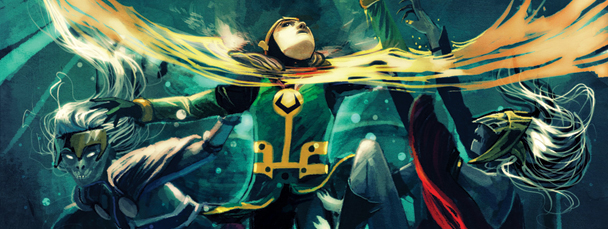|

By Tim Stevens
Given past experiences, this writer was approached to give a second opinion on the client Loki. However, this Loki was wholly different from the one previously treated by myself and staff. Through a process that, I’ve been assured, is difficult for mortals to grasp, the adult Loki we worked with was killed and reborn as an early adolescent.
Doctor Kieron Gillen is this Loki’s primary therapist, but in an effort to provide the client with the best possible care, Dr. Gillen has reached out to this writer in collaboration on this case. Loki has signed all necessary documentation for us to work with one another and share our case notes.
To begin, it is important to look at Dr. Gillen’s most recent client summary, reproduced here:
The patient has a complicated history, to say the least. It's only made ever more complicated by the fact the subject is a self-confessed compulsive liar. There is a constant doubt of where truth begins and ends—or, in fact, if truth ever starts.
Loki is an orphan, adopted into a new family who are “the traditional enemy of his people.” His people are giants. Loki isn't. Loki appears to be 13-year old, and barring a late-growth spurt, it's unlikely he's a giant. While he is evidently superhuman and possibly supernatural, you begin to see why we start to doubt him.
He's previously had a strained relationship with all his adopted family. And then he committed suicide. He believes that all his family believes he was killed and sacrificed himself—but, in fact, it was his attempt to create a new start. Loki identifies as “the god of chaos.” He believes that in acting in a predictably evil way, he's acting against his nature. So, through death and rebirth, he can create the possibility of a new him, with a new personality, and escape history.
When asked how he is aware of this when he has no memories of his previous self, he explains that his history has been explained by his pet magpie, Ikol. I note that's an anagram, and the boy is terribly sarcastic.
Loki fears growing up. Specifically, he fears growing up to become the man he says he once was. He feels persecuted for his previous sins, and suffers beatings from other younger Asgardians, but claims to hold little resentment for it. While it upsets him, he believes he deserves the treatment for his past life's transgressions. He expresses love for his brother, and fears that his actions will betray him, no matter what his best intentions. When asked about free will, he seems doubtful whether it matters or not. “But you're human. I'm not. Maybe I can't change,” he says. He says his only talent is lies. He fears that it will only lead to ill.
For his sizeable charm, I find it difficult to disagree with him. He has also stolen many of my pens.
He says he is pleased that the ruler of his household—“The All-Mother”—has found secret work for him. I'm informed that child labor laws are considerably more lenient for his culture. He is doing “sneaky stuff” for them and “saving the universe, whenever I can.” When asked if he believes this will redeem him in his peers’ eyes, he expresses mild hope. “Unless I somehow cause something even worse in the process. And that's terribly unlikely, isn't it?”
It is struggle for me to not compare this “kid” Loki with the adult counterpart I worked with and I often find myself interpreting his actions as “signs” that the adult Loki is inside him. However, in fairness to the client, I most conclude that much of this is confirmation bias. I am taking his current actions and forcing them into an already existing schema I have for “Loki.” This is no fairer or culturally competent then if I attempted to fit all people named Brad into the same proverbial box. It could be done, but it represents a failure to work with the client before me as opposed to an idea of who I have decided that client must be.
In stepping away, I have to conclude that Dr. Gillen’s perspective on the client, given his presentation in session with myself and a review of Gillen’s notes, seems sound. This younger Loki does seem genuine in his desire to do better than the version of himself that I knew. He is still unreliable and prone to lie even when the truth would be easier and, in some cases, make him look better. However, the lies lack the cruelty and blatant desire to bring harm on to others that marked the previous Loki’s “tricks.” Additionally, this Loki does seem to register a significantly higher level of empathy that the prior version of himself, which seems to be what fuels his desire to do better and “make up” for the actions of the adult god of mischief.
Overall, there is much in this client to cause this writer to be optimistic. However, there are also warning signs that should not be ignored, such as the clipped sarcasm, lying, and apparent kleptomania—although, to be fair, I have not experienced any such loss of items during our sessions. Additionally, the client once let slip something about a brother of who no else seemed to be aware and I can find no record of. Paired with details like his belief he can converse with animals, this may be an indication of dementia or auditory and/or visual hallucinations. Sending Loki on “missions,” such as the one he currently claims to be on, tracking down a creature named “Nightmare,” may serve to exasperate these problems and/or possibly allow him to fall under the sway of a charismatic sociopath that can usher in a Loki more like his adult counterpart. Caution is advised.
Loki is next scheduled to meet with Doctors Kieron Gillen and Richard Elson on March 14. Their notes will be available in file JOURNEY INTO MYSTERY #635.
Psy D. Candidate Tim Stevens, MA is a Practicum Trainee at a community mental health facility and a Dialectical Behavior Therapy Consultant. He works with gods significantly less than usual these days.
|








